Text
Basic Hellenic Supplies
As requested, a list of basic tools! Don’t feel obligated to use any of this, as you really only need yourself to worship the Theoi :) These are just some things I use and find helpful.
Incense:
Incense, resins, etc., are all great to have on hand. Manna was the traditional incense used, which is thought to have been frankincense or something with frankincense. As such, having some is an easy way to have a low-energy offering ready. Along with the incense or resins, you’ll need somewhere to safely burn it, like an incense holder or fire-safe bowl, and you may want a few charcoal discs.Sometimes you can find incense burning kits, complete with the burner and everything else. I’ve seen them at walmart recently.
Bowl and Pitcher:
In the Ancient Hellenic religion, there is a method of cleansing using what’s called ‘khernips’. It’s usually a mixture of sea/salt water, spring water, a burnt match or herb, and a prayer for a Theos’ blessing over it. You cleanse your hands and face with it, and as such, using a pitcher to make and transport your khernips can be quite helpful. This can be easily stored or decorated as you wish, and it keeps water from getting everywhere. Also, keep a towel handy for when you’re finished!
Table/Shelf Space:
To create an altar or shrine. you can use a shelf or table. Usually, you would have it high up if you can, but when it comes to Underworld or Earth Theoi, you would normally worship them closer to the floor. I personally like having my Kthonic shrines and altars on trays and platters to move around more easily. That way, when I need to give an offering outside, I can simply move the tray and not one thing at a time.
Candles:
The hearth-fire was a huge part of everyday life in Ancient Hellas, but it wasn’t the fireplace we know and love. A heart-fire was typically surrounded by stones, and was fairly large, It was in the center of the bustling lives of old. It was where people cooked, got warm, and entertained guests. We don’t really have an equivalent, but we can use symbolism to try and recreate the effect. I try to recommend candles to beginners who face the modern challenge of not having a permanent fire going to Hestia, whether they be real candles or electric ones. They can be found fairly cheap at places like walmart, or even the dollar store. In home decor and crafting stores, there are usually nice electric ones that will last a long while. My Nana gave me an old one of hers, and it works perfectly. It’s nearly as old as I am, so I can testify for their durability :)
Bowls/Cups:
When it comes to giving offerings, burning things, and just worship in general, bowls are really awesome. If you wish to give a libation in a very traditional way, you can try to invest in a bowl shaped like a phiale, linked here. Or, if you’re more modern and like to fill your altar space with lots of quirky things, try finding a fancy libation cup to use specifically for rituals. Here is my personal favourite (due to the punny nature it holds) and another great one. But if you’re like me and are low on funds or are trying to remain a secret worshiper, then any cup or bowl will do. I find candy dishes to be quite beautiful and discreet, as a sidenote.
Urn/Vase:
Iv’e seen this more often recently, and I absolutely love it. I use a glass bottle keep my incense ash and burnt offerings in, and then later dedicate them to Zeus Ktesios at the end of each month on the Deipnon, but you can use an urn, a pot for a plant, an ornate vase, a jar, or a simple glass bowl to keep them in. Just make sure it isn’t flammable, since ashes are known to start fires when not properly disposed of. Along with this topic, you may want to consider finding a sealable container to potential make your very one Kathiskos :) Here are two links for that: x and x.
Box/Place for Votive Offerings:
I personally use a closable box for votive offerings, and I call it my “vault”. In the temples of Greece, there were vaults where you could leave offerings to a Theos. Similarly, this is what the box would be for. It’s for non-perishable things. I have used a bowl before, and a cup as well. When I need to get a bigger container, I put the offerings together in a shoebox, and then I have more room. Whatever works best for you will do. If you don’t usually give votive offerings, I wouldn’t worry about getting anything to keep them in.
Representations of the Theoi:
This is more of an optional thing, but a lot of people enjoy having a representation to focus on while worshiping. It can be a statue, a drawing, a symbol, or even a framed hymn or prayer. If it helps you feel more connected to a Theos, you can use it. I’m working on drawing (it’s not very good) the Olympians to hang near my household altar.
Barley:
Although how barley is used is debated throughout the community and within scholarly circles, we do know it was used. Some say it was used to make a ritual drink, and others believe you would “scatter” it, meaning you would throw it around your altar to cleanse it. I am working on getting some barley to have in a vase just to cleanse my altar space a bit more, though I don’t plan on literally scattering it.
Hellenic Text:
Having copies of things like The Odyssey, The Iliad, and the Homeric Hymns are all great. I can provide a few resources as to my personal favourites if you need any as well. Reading and studying literature from the prime example of Hellenismos will help build a quality understanding of who you’re worshiping and how you do it. I learned so much just by reading through The Odyssey, and it really helped strengthen my connection with the ancients as well. What you read doesn’t have to be religious, necessarily, it could be something like the poetry of Sappho, or a Philosopher’s study of the world around them.
Notebook/Online Cloud Storage:
You will learn so much as you begin your journey. Taking notes, saving articles for further review, or just as reference, and documenting what you need to is awesome. Evernote, Google Drive, and Dropbox are all good things you can use to organize and combine your knowledge, but a good ole spiral notebook or binder works just fine. I like to keep my sacred texts in the physical copy, but I also have several online versions for easy access. My kindle also houses a couple things for when I’m on the go.
2K notes
·
View notes
Text
An interesting read for my fellow Greco-Buddhists
#Greco-Buddhism#Buddhism#hellenistic#Hellenism#hellenistic polytheism#gods#Greek gods#Buddha#Buddhist
3 notes
·
View notes
Text
Evening Prayer to Hera
Holy Queen of Heaven,
Lady of the Sky and Stars,
Thank you for your guiding light.
May I sleep well under your midnight sky
And serve you well in the coming day.
461 notes
·
View notes
Text
“Circe?”
“Yes Odysseus?”
“Where’s my crew?”

158K notes
·
View notes
Text
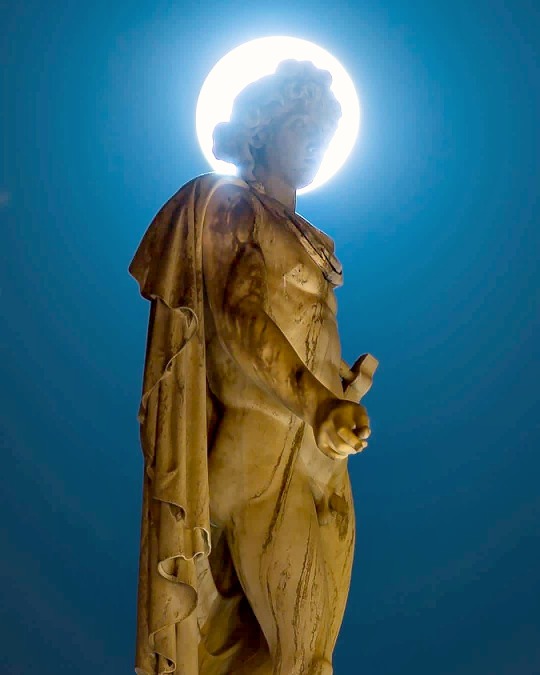
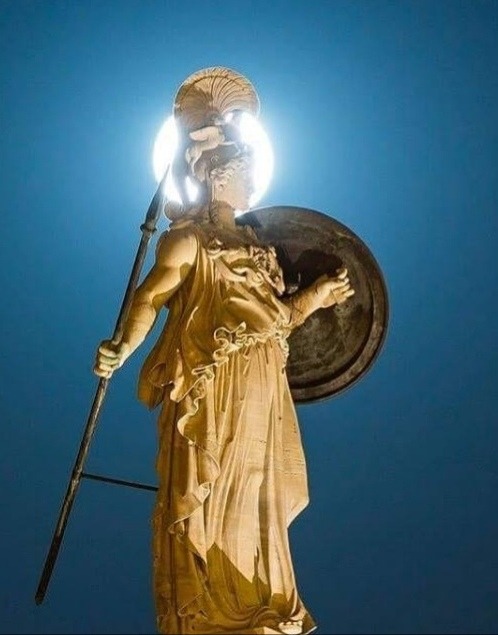
Apollo and Athena on a full moon 🌕
Academy of Athens
71K notes
·
View notes
Text
Apollo 🌼☀️
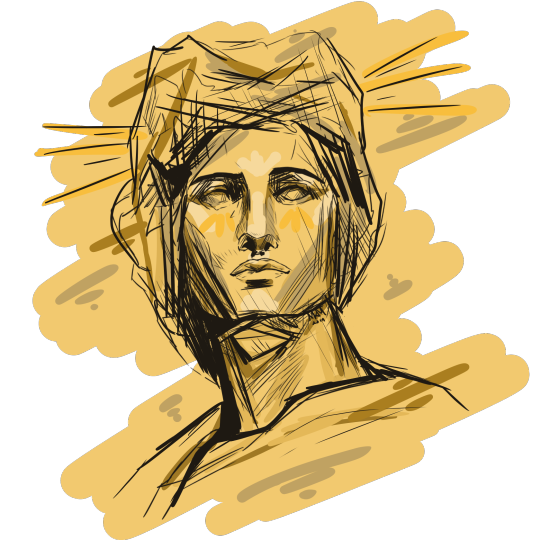
A little devotion doodle I made today that I felt needed to be shared!! I hope you all like it!!
(Might turn it into a sticker, who knows?)
2K notes
·
View notes
Text
The Athenian Calendar 🏛️🌿📅
There was no standard calendar in ancient greece, however the most written about and commonly used one by modern reconstructionists is the Athenian Calendar! This calendar can be easily incorporated into the Gregorian Calendar as well (in my opinion)
I would like to thank @hermesmystic for creating a beautiful lesson on our Hellenismos Online Temple discord server! It helped a lot with this post ♥
It’s a long one so brace yourself!
D A Y S 🌇
The days in the Athenian Calendar begin at sunset. This was important for being able to observe festivals or holy days, if they were to begin at midnight like it does for us, the Greeks would have had a much harder time practicing their religion.
The main Olympians have sacred days of the week which can be used if you would like to make small daily offerings. Weekdays have two gods and weekends have three. A week in review would be:
Monday: Artemis and Demeter 🏹🌾
Tuesday: Ares and Athena ⚔️📜
Wednesday: Hermes and Hephaestus 📬🛠️
Thursday: Zeus and Hera 🌩️💍
Friday: Dionysus and Aphrodite 🍇🕊️
Saturday: Hestia, Hades and Persephone 🕯️💀
Sunday: Apollo, Posedion and Amphitrite ☀️🌊
Obviously you don’t need to change your clock and begin living your life around this BUT it is useful to remember.
M O N T H S 🌑
The months are where it gets a little complicated! So we’ll begin with the way the months began and ended and that is with the new moon.
Most Athenian months will fall between two Gregorian months, and sometimes a Gregorian month can have two full moons.
A rule of thumb to remember with this is an Athenian month begins on the last (or only) new moon of a Gregorian month and ends on the first (or only) new moon in the next Gregorian month.
The Athenian Calendar also has seasons like the Gregorian calender, and these seasons have three months within them.
S u m m e r: 🌻🏄
Season Theme: Setting foundations and goals
Hekatombion (holy month of Zeus 🌩️) - Falls between July/August.
Theme: Planning and getting your life sorted
Festivals for this month are the:
Aphrodisia (6th), Kronia (12th), Synoikia (15-16th) and Panathenaia (28th)
Metageitnion (holy month of Demeter 🌾) - Falls between August/September
Theme: Securing foundations from the previous month
This month doesn’t have confirmed festivals but these are believed to fall under this month:
Metageitnios (Unknown), Herakles Emera (Unknown)
Voedromion (holy month of Hestia 🕯️) - Falls between September/October
Theme: Focus on spiritual/religious comfort
Festivals for this month are the:
Genesia (5th), Kharisteria (6th), Boidromia (7th), Eleusinian Mysteries (15th-21st)
The Eleusinian Mysteries was the most important festival in the Athenian year held in honour of Demeter and Persephone. What happened during this festival isn’t well known so it’s challenging for a modern Hellenic Polytheist but for the ancient Greeks acknowledging the festival was important, acknowledging meant to observe the festival, in the modern sense this can be doing a personal ritual.
A u t u m n / F a l l: 🍂🥧
Season Theme: Tackling hardships, the gods challenge
Pyanepsion (holy month of Ares ⚔️) - Falls between October/November
Theme: Time for tackling hardships
Festivals for this month are the:
Proerosia (5th), Puanepsia (6th), Oskhophoria (7th), Theseia (8th), Stenia (9th), Thesmophoria (11-13th), Khalkeia (30th)
Maimakterion (holy month of Artemis 🏹) - Falls between November/December
Theme: Time for taking care of yourself through hardship
Festivals for this month are the:
Maimakeria (unknown), Pompaia (20-end)
Poseideon (holy month of Poseidon 🌊) - Falls between December/January
Theme: A time to prove work ethic (or arete) to the gods
Festivals for this month are the:
Poseidea (8th), Rural Dionysia (last two weeks of the month), Haloa (26th)
W i n t e r: ❄️☃️
Season Theme: A time to recover and revise goals
Gamelion (holy month of Hera 💍) - Falls between January/February
Theme: Time to reconnect with the gods
Festivals for this month are the:
Lenaia (12-15), Gamelia (26)
Anthesterion (holy month of Haephestus 🛠️) - Falls between February/March
Theme: Time for ingenuity/finding creative solutions
Festivals for this month are the:
Anthesteria (11-13th), Diasia (23**/28th)*, Lesser Mysteries (unknown)
Elafevolion (holy month of Athena 📜) - Falls between March/April
Theme: Reflecting on potential weaknesses and improving
Festivals for this month are the:
Elapheblia (6th), Asklepieia (8**/9th)*, Greater Dionysia (9-13th), Pandia (14/17th**)*
S p r i n g: 🌷🐣
Season Theme: Strength and Hope!
Mounikhion (holy month of Aphrodite 🕊️) - Falls between April/May
Theme: Celebrate the progress you’ve made!
Festivals for this month are the:
Feast of Eros (4th), Mounikhia (6/16th**)*, Olympieia (19th)
Thargelion (holy month of Apollo ☀️) - Falls between May/June
Theme: Faith and Divination, working hard
Festivals for this month are the:
Thargelia (6-7th), Plunteria (Last week with the peak on 25th)
Skiroforion (holy month of Hermes 📬) - Falls between June/July
Theme: Making goals for the new year, devotion
Festivals for this month are the:
Arrhephoria (3rd), Skirophoria (12th), Dipolieia (14th)
[* means it can be observed on either day]
[** means that is the prefered date to observe it]
Each month has an 11 day transitionary period from one to the next called the Neos Minas, each day (except one) has an event that help to fully transition spiritually from the theme of one month to the next.
Day 1: Chthonia 1 - the 3rd day before the end of the old month 🧹
Day 2: Chthonia 2 - the 2nd day before the end of the old month 🧹
Day 3: Hekate’s Deipnon - last day of the old month 👻
Day 4: Noumenia - First day of the new month ✨
Day 5: Agathos Daimon - 2nd day of the new month 🎉
Day 6: Tritomenis - 3rd day of the new month / Athena’s birthday 📜
Day 7: Tetras - 4th day of the new month 💖
Day 8: Rest Day - 5th day of the new month 🥱
Day 9: Birth of Artemis - 6th day of the new month 🏹
Day 10: Birth of Apollo - 7th day of the new month ☀️
Day 11: Poseidonas - 8th day of the new month 😤
M o n t h 1 3 ?
Occasionally there will be two new moons in a Gregorian month, this was a dillema for the ancient Greeks as well and their solution was to add a 13th month! Mounikhion has to begin and Elafevolion has to end on the same day but there are two new moons… what do we do? Who do we honour?!
DIONYSUS TIME BAYBEEE 🍇🍇🍇🍇
Dionysus would be given a month whenever this issue would arise and it fit his theme perfectly, to come in and cause chaos! This month never had any festivals as it was so sparadic in length or time of year, routine went out the window!
In even more Dionysus fashion this month isn’t named after him! It’s called Duo Poseideon and has nothing to do with Poseidon’s month!
Y E A R S 🎉
Years in the Athenian calendar begins in the summer, giving the Greeks plenty of energy to honour and celebrate. The final day of the year was always to honour Athena and Zeus for blessings in the new year
To keep with the theme of four seasons, the years were also grouped into fours called Olympiads 4 years = 1 Olympiad. The way to write the year would go as such:
“Year 4 of the 704th Olympiad” Once the year is complete this summer it will become “Year 1 of the 705th Olympiad”
The years also come with their themes, they follow that of the seasons.
I hope this post was helpful! Sorry if I got anything wrong but I hope you can add some of this information to your worship and have fun with it! Don’t worry about trying to follow the calendar perfectly.
Gods bless xx ♥
2K notes
·
View notes
Text
Ares Offerings

"Ares is the Olympian God of war, battlelust, courage, and civil order."
Large Altars:
Strong, dark red wine
Strong whiskey
Pure water
Black coffee
Black tea
Olive oil
Beef
Red meats in general
Cooked fat from meats
Blood from cut meats
Heavy spices
Spicy foods
Garlic
Frankensince
Sandalwood incense
Red, black, and dark purple candles
Art or statues of Him
Statues of horses or dogs
Weapons, armor, and shields (art, statues, toys, handmade, etc.)
Trophies
Small/Hidden Altars:
Spicy jerky
Sport drinks / protein shakes
Hand drawn or printed art of Him
Art or images of dogs, horses, and vultures
Feathers from vultures, woodpeckers, or barn owls
Red crystals such as garnets, rubies, bloodstone, etc.
Iron or steel jewelry
Red flowers, like roses
Thorns
Miniature or toy weapons and armor, especially helmets
Snake skin
Animal teeth
Write down your fears or successes and give them to Him
Medals and ribbons you've earned
Antiques
Photos of riots or past wars
Devotional Acts:
Create a playlist and listen to music that makes you feel brave/empowered
Donate to the Rape Crisis Center or other similar programs
Donate and support victims of war
Cook with garlic or heavy spices that you haven't tried before
Try new things and don't feel ashamed about doing so
Tell Him about your accomplishments
Tell Him about your fears
Learn about shadow work and try it for yourself
Learn about history, past wars, and past riots. Learn what they accomplished or failed to accomplish
Learn and educate yourself about the downsides of war and what can happen to the people affected by wars
Take care of your mental health by going to therapy, eating, drinking enough water, and remembering to take your medication
Partake in combat sports like martial arts, fencing, etc.
Exercise, find some fun workouts to do!
Play some strategy games like chess, Risk, Civilization, etc.
Stand up for yourself and what you believe in, write to your governor/mayor for things you want to see changed, attend riots, etc.
At the same time, don't push yourself if your physical or mental health isn't well, He doesn't want His devotees injured
A good place for His altar would be at the front door of your house or bedroom as He was considered to be the frontline of protection.
Pray to Him for strength, ability to fight and defeat enemies, courage, to keep others safe, and help in a battle.
Sources:
Artwork from the game Hades by Supergiant Games
https://occult-world.com/ares/
https://vocal.media/futurism/ways-of-worship-ares
https://www.theoi.com/Olympios/Ares.html
1K notes
·
View notes
Text
Morning and Evening Prayers for Artemis, Apollon and the Agathos Daimon
Morning Prayers, in order:
Apollon Paion,
Beautiful healer of all mortals,
You with voice and lyre of gold,
As your bright sun rises, I greet your brilliance,
And ask for your radiant blessings,
That your passion runs through my veins.
Show me that which I cannot see,
And let your fire ever burn in my heart.
Artemis Potnia Theron,
Queen of Beasts,
You who protects all girls,
As a new day dawns, and your soft moon wanes,
I greet you and ask for your radiant blessings,
That your strength runs through my veins.
Show me how to be myself, unapologetically,
And let your hymns ever sing your glory through me.
Agathos Daimon, my companion,
Who comes beside me in every step,
Turning away evil and protecting me always,
As a new day dawns, and Helios rises,
I greet you and ask for your protection,
That you once again walk beside me, Zeus Ktesios.
Show me always the correct path to tread,
And guide my feet always, oh, wise Agathos Daimon.
Evening Prayers, in order:
Artemis Selasphoros,
Bringer of the light of the moon,
Hekatebolos, Khrysalakatos,
Now I come before you as your silver moon rises,
In piety and in thanks for all you have given me,
And for your voice, which ever brings me delight.
Apollon Mousegetes,
As you have lead the Mousai,
You lit the lamps before me today.
And now I come before you as your bright sun wanes,
In piety and in thanks for all you have given me,
And for your light, which ever grants the sparkle in my eyes.
Agathos Daimon,
As sure as the sun has shone bright today,
Such has your unwavering companionship.
I come before you as Zephyrus claims Helios once more,
In piety and in thanks for all you have given me,
And for your endless guidance and protection.
My order is simply because of the times of day that are most associated with them, always ending with the Agathos Daimon, to keep them close. Epithets are probably transliterated a bit incorrectly, I need to double check.
1K notes
·
View notes
Text
I am a lover, not a fighter. I honor Aphrodite with my kindness, but my kindness is not weakness, for I will fight, with Ares beside me, for love.
1K notes
·
View notes
Photo
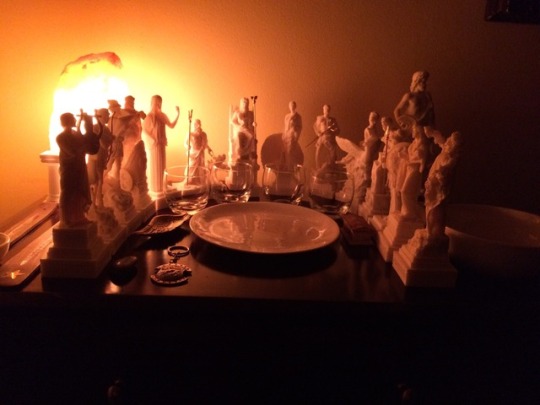
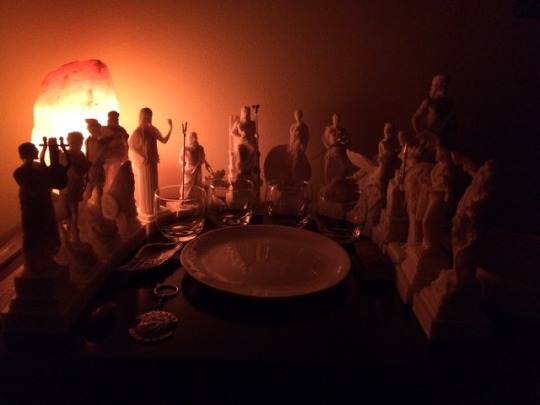
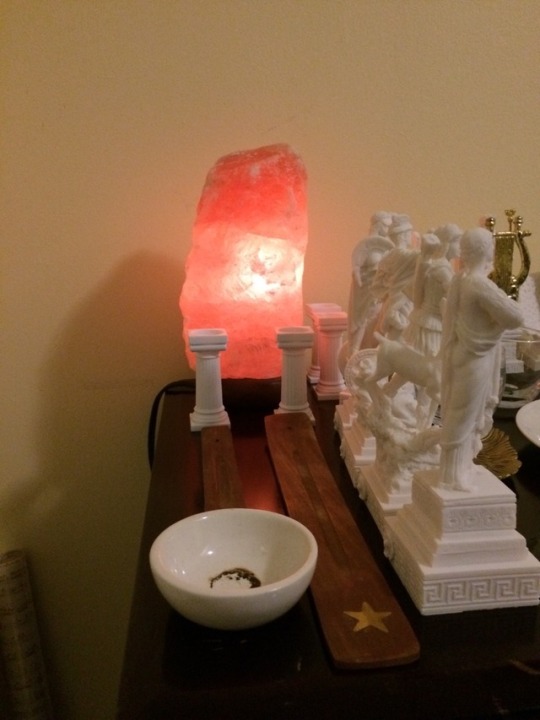
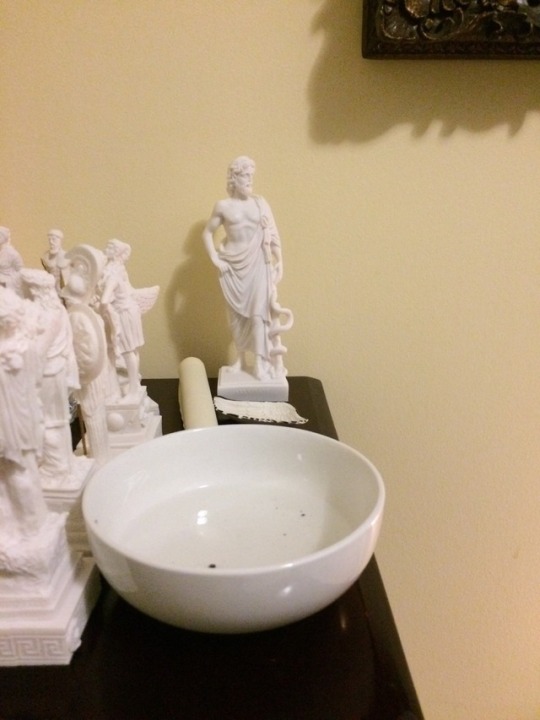
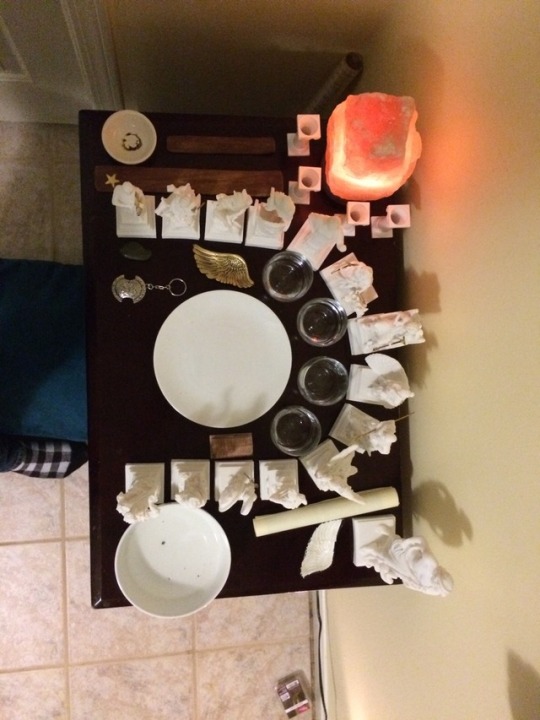
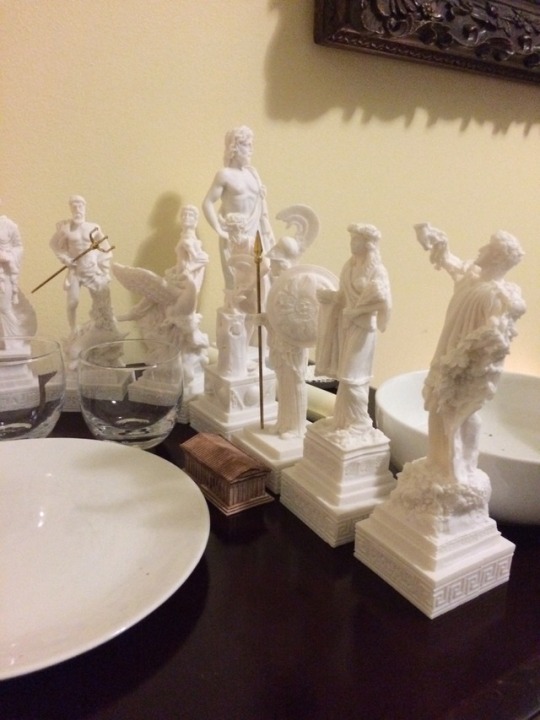
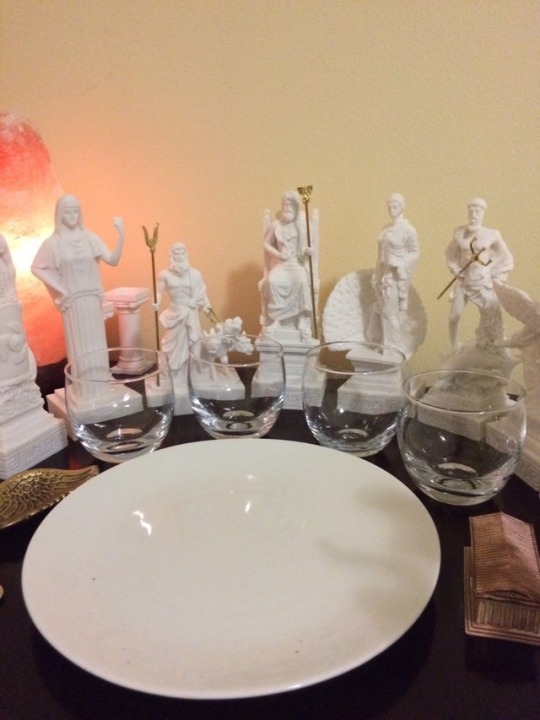
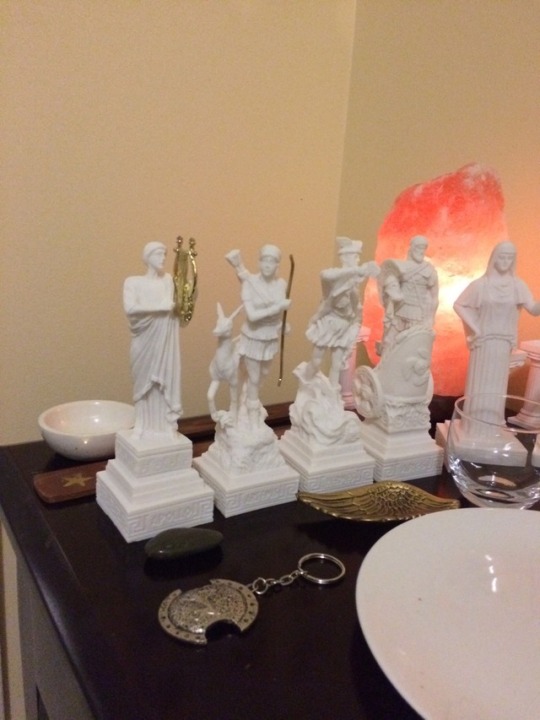
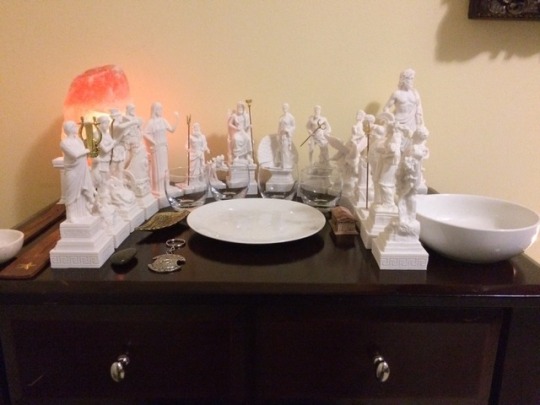
Opened my statues yesterday and set up my altar. Sooooo amazing and worth it :) thank the gods they all got here safe!
822 notes
·
View notes
Text
Modern Offerings for Ares
Some of these are things I’ve personally given him and some are ideas for the future. As always, you know your relationship with him best.
Olive oil
Hot sauce
Chocolate pudding with a sprinkle of cayenne
Raspberries
Jalapeno peppers
Some of your fitness drink
Drinking alcohol (beer/fine wine)
A cinnamon stick
Beef jerky
A bite-sized slice of steak
Black coffee
Chips and spicy salsa
A fried egg
A can of soda
Caramel
A safety pin (for showing support to minorities)
An energy bar
Broken glass (please be careful!)
A piece of sushi
Maraschino cherries
Storm water
Dark chocolate
Flowers
Chia pudding
This list refers specifically to things you can put on his altar. Feel free to reblog with any offering ideas you have!
1K notes
·
View notes
Text
Low Key Offerings
Here are offerings to the gods without looking like offerings to the gods
Books: Great for Athena, but can be offered to other gods as well. I offered "The Art of War" to Ares once.
Drawings: Of the gods or of anything else. If drawn for them they work
Poems/Written works: Poems, stories, songs. They all can be written or typed and printed and set on the alter or other area dedicated to the gods
Jewelry: Any kind. They just look like you set jewelry down
Keepsake Box: I did this as a offering box and also as an offering to Artemis when I was younger
Coins: Good for Charon, Hermes, and Hades
Flowers: Everyone loves flowers and they just look like decor
Statues/Figurines: It's art. As long as you aren't overly decorating them or putting other offerings at their feet no one will think "Hey now that there's an offering"
Stuffed animals: My kids do this. Recently a stuffed owl was offered to Athena
Sea Shells: You can just put them in a pretty box or jar.
3K notes
·
View notes